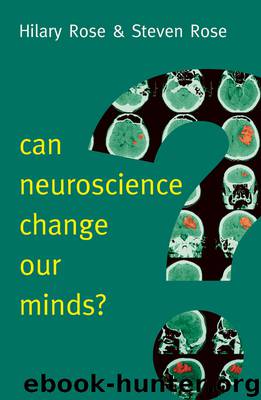Can Neuroscience Change Our Minds? by Hilary Rose Steven Rose

Author:Hilary Rose,Steven Rose
Language: eng
Format: epub
Publisher: John Wiley & Sons, Inc.
Published: 2016-08-01T04:00:00+00:00
(1) Synapses – the more the better?
According to one of the early interventionist training programmes drawing strongly on Perry, ‘an adverse environment will lead to a child having 25% less synapses or connections in their brains than they could have had, while a stimulating environment can lead to 25% more connections’.18 One of the key features of the early development of the brain is a vast over-production of neurons and synapses. Just as it takes myriads of sperm to ensure that one is able to reach and fertilize the egg, so it takes myriads of neurons to be born during development to ensure that some survive and wire up appropriately. A process called apoptosis – programmed cell death – then removes the surplus. So too with synapses, whose proliferating numbers during early development are steadily pruned away, so that by adulthood in some brain regions there are less than half of those present at age three. (These anatomical measurements can only be made post-mortem; there is no way of counting cells or synapses in the living human brain.) Neuroscientists believe that this pruning of redundant synapses both removes unused connections and improves the efficiency of those that remain. Another problem with the synapse number claim is that it implies that once a synapse is made, it remains in place. However, time-lapse studies of the brain in experimental animals shows that synapses are highly dynamic, continually being modified, disappearing and being reformed throughout life. (‘Use it or lose it’ is no bad slogan.) Indeed, this remodelling capacity – plasticity – is the neural mechanism that enables a person to learn from experience, remember and change how they respond. Every thought or action leaves its trace in the brain. So the claim about the significance of synapse numbers is misleading.
Download
This site does not store any files on its server. We only index and link to content provided by other sites. Please contact the content providers to delete copyright contents if any and email us, we'll remove relevant links or contents immediately.
Enlightenment Now: The Case for Reason, Science, Humanism, and Progress by Steven Pinker(7306)
A Journey Through Charms and Defence Against the Dark Arts (Harry Potter: A Journey Through…) by Pottermore Publishing(4798)
The Immortal Life of Henrietta Lacks by Rebecca Skloot(4571)
A Journey Through Divination and Astronomy by Publishing Pottermore(4379)
Elon Musk by Ashlee Vance(4120)
Origin Story: A Big History of Everything by David Christian(3681)
COSMOS by Carl Sagan(3617)
Alchemy and Alchemists by C. J. S. Thompson(3513)
Bad Pharma by Ben Goldacre(3420)
Enlightenment Now by Steven Pinker(3366)
Shadow of Night by Deborah Harkness(3356)
Inferior by Angela Saini(3311)
A Mind For Numbers: How to Excel at Math and Science (Even If You Flunked Algebra) by Barbara Oakley(3294)
Origin Story by David Christian(3194)
The Code Book by Simon Singh(3177)
Signature in the Cell: DNA and the Evidence for Intelligent Design by Stephen C. Meyer(3125)
The Elements by Theodore Gray(3050)
A Brief History of Time by Stephen Hawking(3022)
A Journey Through Potions and Herbology (A Journey Through…) by Pottermore Publishing(2844)
